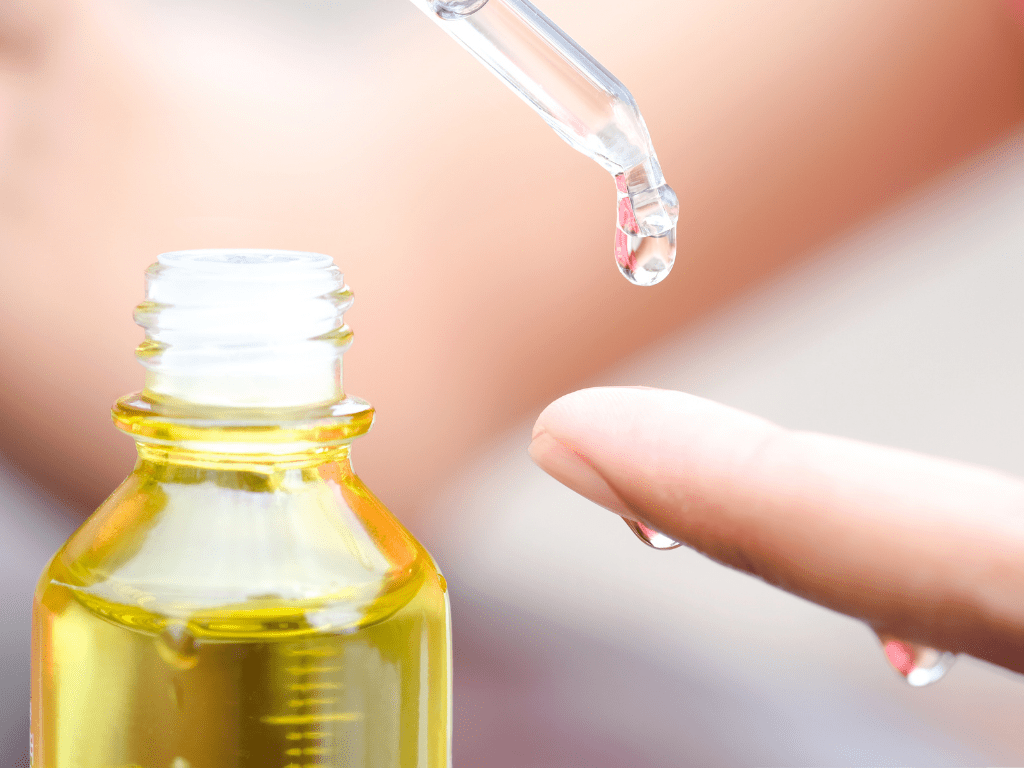Everything You Need to Know about Facial Oils
The skincare sector is filled with mixed messages. For each skin specialist willing to hype an ingredient, there’s another armed with studies that disprove their theory. One day we are told hyaluronic acid is the Holy Grail for skin hydration however the next, someone’s pulled some bizarre stuff from a very niche vegetable and all of a sudden there’s a fresh skin hero in town. Tropika Club attempts to clear up this confusion with this specific article on facial oils.
Table of Contents
No Time to Read? Here’s a Snappy Summary of This Article
- Sebum and lipids are natural oils that balance your skin. Facial oils add extra oil to dry skin and may have other benefits like anti-inflammatory or anti-bacterial properties.
- Facial oils can plump the outer layer of dead skin cells, but they cannot penetrate deeply to add hydration. They are best used with other moisturising products to seal in moisture.
- Facial oils should be the final step in your night-time skincare routine, after water-based products like serums. This is because oils help to bind water to the surface of the skin, locking in any moisture.
- Facial oils may interfere with the application of SPF, so it is recommended to use them at night or wait at least 5-10 minutes before covering skin with sunblock. SPF is always non-negotiable.
- For this skin type, you are best using a blend of oils that contain fatty acids, antioxidants, vitamin E, and other vitamins, such as vitamin B3 (niacin).
1. Your skin already makes its own oil
Touch your forehead. That oily substance that you feel? That is sebum, one of the oils the skin makes obviously. It also contains lipids, which are fats and oils which comprise the epidermis. ‘Normal’ skin features a balanced generation of oils, whereas dry skin is lacking in petroleum. Oily skin, on the other hand, creates more oil than your skin actually needs.
So what exactly does one face oil do? Quite simply, the function of a facial oil would be to include oil to skin which otherwise lacks it, which explains why they’re best for people with dry skin. More on this later. However, many oils, from essential oils to seed oils, are purported to have added benefits, from the anti-inflammatory into the anti-bacterial.

2. Face oils are not as intensely hydrating as you might hope
Many people use facial oils to moisturise their skin, but they might not be aware of how they actually work. Facial oils can help to make your skin look more plump and smooth, but they do not add any hydration to the deeper layers of your skin. This is because the outer layer of your skin, called the stratum corneum, is made up of dead skin cells that cannot absorb water. Facial oils have a large molecular size that prevents them from penetrating beyond this layer. However, this does not mean that facial oils are useless. They can still play a role in your skincare routine, as long as you use them with other moisturising products. For example, you can apply a hyaluronic acid serum or a light moisturiser first, and then top it off with an oil. This way, the oil will act as a barrier that locks in the moisture from the other products, preventing it from evaporating. Facial oils are known as occlusives, which means they create a protective film on the skin surface. So, while the oil itself might not hydrate your skin deeply, it can help to keep the hydrating ingredients in place for longer, allowing them to do their job.

Read Also:
3. Face oils should be applied last
If you want to get the most out of your facial oils, you should use them at night, after you have applied all your other skincare products. This is because oils work best when they are layered on top of water-based products, such as serums, which should be applied right after cleansing your skin. The reason for this is that oils have the ability to trap water molecules on the surface of your skin, preventing them from escaping into the air. This way, the water-based products can deliver their hydrating and nourishing benefits to your skin, while the oils can seal them in and protect them from evaporation. By using oils as the last step of your night-time skincare routine, you can ensure that your skin stays moisturised and healthy throughout the night.
4. Face oils may mess with your SPF
Are you thinking about using an oil on your morning routine? It’s hard to employ SPF on an oily surface, so it is recommended to use them at night or wait at least 5-10 minutes before covering skin with sunblock. And don’t forget, SPF is always non-negotiable. For skin that’s dry, rough, and dull-looking, you are best using a blend of oils that do not just include fatty acids but are rich in antioxidants, vitamin E, and other vitamins, including Vitamin B3 (niacin).

Conclusion
Facial oils are not a new trend, but they have gained popularity in recent years as more people are looking for natural and effective ways to nourish their skin. Facial oils can offer many benefits, such as moisturizing, soothing, repairing, and protecting the skin. They can also help with signs of aging, inflammation, and dryness.
However, facial oils are not a one-size-fits-all solution. Depending on your skin type, needs, and preferences, some facial oils may work better for you than others. Some facial oils may also have drawbacks, such as clogging pores, causing irritation, or interfering with sunscreen.
That’s why it’s important to do your research before choosing a facial oil. You should look for high-quality oils that are suitable for your skin type and condition. You should also check the ingredients list and avoid synthetic or fragranced oils that may cause harm. You should also patch test any new product before applying it to your face.
If you’re unsure about which facial oil to use or how to use it, you can always consult a dermatologist or a skincare expert for advice. They can help you find the best facial oil for your skin and guide you on how to incorporate it into your skincare routine.
At Tropika Club Magazine, we are always on the lookout for the best skincare products and tips for our readers. We hope this article has helped you learn more about facial oils and how they can benefit your skin. If you have any questions or feedback, feel free to leave a comment below or contact us through our website.
Remember, facial oils are not a magic bullet that can solve all your skin problems. They are just one part of a holistic skincare approach that involves cleansing, exfoliating, toning, moisturizing, and protecting your skin. By using facial oils wisely and in combination with other skincare products, you can achieve healthy and radiant skin that glows from within.

Frequently Asked Questions (FAQ)
Q: What are the best facial oils for oily skin?
A: If you have oily skin, you might want to avoid facial oils that are heavy or comedogenic, meaning they can clog your pores and cause acne. Instead, look for facial oils that are lightweight, non-greasy, and balancing. Some examples are argan oil, jojoba oil, grapeseed oil, and tea tree oil. These oils can help regulate your sebum production and prevent excess oiliness.
Q: What are the best facial oils for dry skin?
A: If you have dry skin, you might want to look for facial oils that are rich in fatty acids, antioxidants, and vitamins. These oils can help nourish, moisturize, and protect your skin from dehydration and environmental damage. Some examples are coconut oil, almond oil, olive oil, rosehip oil, and marula oil. These oils can help restore your skin’s natural barrier and lock in moisture.
Q: What are the best facial oils for aging skin?
A: If you have aging skin, you might want to look for facial oils that have anti-aging properties, such as boosting collagen production, reducing wrinkles and fine lines, improving skin elasticity and firmness, and brightening skin tone. Some examples are rosehip oil, argan oil, olive oil, almond oil, and pomegranate seed oil. These oils can help stimulate cell renewal and repair your skin’s damage.
Q: How do I apply facial oil correctly?
A: The best way to apply facial oil is after cleansing and toning your skin, and before applying your moisturizer or sunscreen. You only need a few drops of facial oil for your entire face. Warm the oil between your palms and gently press it onto your skin. Avoid rubbing or tugging your skin as this can cause irritation or inflammation. You can also mix a few drops of facial oil with your moisturizer or foundation for extra hydration and glow.
Q: How often should I use facial oil?
A: The frequency of using facial oil depends on your skin type, needs, and preferences. Generally, you can use facial oil once or twice a day, depending on how dry or oily your skin is. If you have oily skin, you might want to use facial oil only at night or every other day. If you have dry skin, you might want to use facial oil both in the morning and at night. You can also adjust the amount of facial oil depending on the season or climate.
Q: How do I choose the right facial oil for my skin type?
A: The right facial oil for your skin type depends on several factors, such as your skin concerns, goals, preferences, budget, and availability. The best way to choose the right facial oil is to do some research on the ingredients, benefits, reviews, and recommendations of different facial oils. You can also consult a dermatologist or a skincare expert for professional advice. Alternatively, you can try out different samples or trial sizes of facial oils before buying the full-sized product.

Have an Article to Suggest?
Tropika Club is always looking for new and exciting content to feature in their magazine and they value the input of our readers. If you have any noteworthy content or articles that you believe would be a great addition to Tropika Club’s magazine, we are open to suggestions and encourage you to reach out to us via email at [email protected]. By doing so, Tropika Club values your expertise and knowledge in the matter and appreciates your willingness to help. We will review your recommendations and update our list accordingly
Meanwhile, Check Out Tropika Club’s Ecosystem of Websites

Tropika Club Magazine – Tropika Club Magazine is a Singapore-based publication that features articles on a wide range of topics with a focus on local businesses and content for the region. The magazine emphasizes supporting local businesses through its #SupportLocal initiative, which includes coverage of everything from neighborhood hawker stalls to aesthetic clinics in town. In addition to highlighting local businesses, Tropika Club Magazine also covers a variety of local content, including beauty, lifestyle, places, eats, and what’s on in Singapore and the Asia Pacific region.
Tropika Club Deals – Tropika Club Deals is a leading online deals and voucher shopping site in Singapore, offering amazing discounts on beauty, wellness, and fitness products and services. It’s the perfect platform for customers who want to discover the best deals without having to commit to a specific appointment date and time. These deals are available at major beauty stores, facial salons, hair salons, and other brands in Singapore, with no minimum spend required. Choose from guaranteed discounted deals in the categories of hairstyling, hair removal, facial & aesthetics, body slimming, brows & lashes, nails & makeup, massage & spa or fitness & wellness. Tropika Club Deals is also ideal for customers who want to buy vouchers as gifts or to use for the future. So whether you’re looking to save money on your next haircut or want to treat yourself to a relaxing massage, Tropika Club Deals has got you covered with the best voucher and coupon deals in Singapore!




